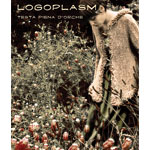
CD-R, Afe Records, 2008
www.logoplasm.org
The two persons behind Logoplasm, Laura Lovreglio and Paolo Ippoliti, have been working together since 2001 in the everyday assemblage of drones, electro-acoustic sounds and field recordings. Their realm of feedback and pink noise, voyeurism and mundanity, and comfort and fear challenges listeners to discover significance in the thirty-five minutes of “Testa Piena D’Orche” (meaning “head full of orcas”) – a struggle that may well leave some wanting.
“Testa Piena D’Orche” is divided into two distinct major cycles, evoking spaces both indoor and outdoor, with sounds both familiar and unsettling. The composition fades into being over the first several minutes with a vaguely wobbling tone that remains throughout much of its initial half. As this first cycle progresses, an ephemeral chorus builds and tapping chimes mimic a broken melodic cadence. After ten minutes, laughing and enthusiastic conversation dominates, but a few minutes later these voices undergo increasing flashes of distortion as the chimes drop out. A sort of empty space ensues. The original tonal backdrop is replaced as the second cycle commences, wherein faint, garbled radio mutterings emerge, along with plucked strings and muffled sounds like wind across a microphone. Twenty minutes into the piece, a shimmering treble rises over splashing water and, in time, the play of distant thunderstorms. Although the composition by this point has become (and remains) loud, the treble drone shifts by degrees, losing its piercing quality, while movement persists in under layers of crackling and white noise. From this point forward things are fairly stable, aside from interjections of shrill wind and a spate of closer rainstorms near the end.
This stuff might be what the world actually sounds like, if one takes the time to listen, and listen closely. But then again, listening is such a selective experience, it’s doubtful that what one individual focuses upon in the aural environment will match another’s perception. This is where Logoplasm lends assistance, or what might be its intent. By choosing certain elements and excluding others, highlighting one sound and letting alternatives fall into the background, the duo creates a very personal auditory episode. Although “Testa Piena D’Orche” presents a successfully ruminative quality in its dichotomies, the delivery unfortunately tends toward colorlessness and tedium.
[5/10]
— Dutton Hauhart
